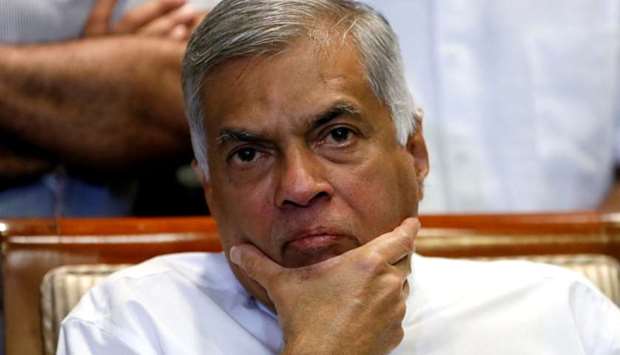A group of Tamil lawmakers Thursday threw their support behind Sri Lanka's ousted prime minister, cementing his parliamentary majority in a surprise move that emboldens his stake to lead the country.
The Tamil National Alliance holds the balance of power in parliament and has emerged as kingmaker in recent weeks, with rival factions jostling for their support as Sri Lanka drifts without a government.
The island has been in crisis since October 26 when the president sacked Ranil Wickremesinghe as prime minister and appointed Mahinda Rajapakse, a charismatic but divisive former leader.
Parliament has twice voted against Rajapakse, sparking brawls in the chamber between his supporters and those backing Wickremesinghe, who like his rival has refused to stand down.
President Maithripala Sirisena -- who is under pressure to prove his appointee Rajapakse commands support -- says Wickremesinghe, a former ally turned foe, does not enjoy a majority strong enough to form government.
The war-era strongman Rajapakse has doubled down and backed by Sirisena, has named a cabinet and assumed duties as head of a disputed government without parliamentary support.
The two rivals have been neck and neck trying to cobble together enough backing, negotiating with key legislators and trying to lure across defectors.
But in a surprise development Thursday the alliance of Tamils, the island's second-largest ethnic group, endorsed Wickremesinghe, providing him 14 seats and a clear majority in parliament.
‘Normally we would not have taken sides but in this case we had to come out and take a stand in the interest of democracy,’ Tamil legislator Dharmalingam Sithadthan told AFP.
As president, Rajapakse was credited with crushing a decades-long Tamil separatist war in 2009. But troops under his command were also accused of killing tens of thousands of Tamil civilians in the process.
There was no immediate response to the developments from Sirisena.
- 'Rogue government' -
The president said at the weekend he would never recognise Wickremesinghe as prime minister -- even if he enjoyed the full support of parliament.
Sirisena suspended the legislature and called snap elections after naming Rajapakse prime minister at a late-night swearing in ceremony.
The Supreme Court refused to defend his actions, ordering that parliament be reconvened and the elections called off until the legal challenge is heard.
The country has teetered on the edge of a full-blown crisis ever since, though there has been no breakout of serious violence.
Rival politicians brawled and hurled chilli powder about the chamber during rowdy sessions of parliament two weeks ago.
Wickremesinghe's party, backed by the Tamils and other minority parties, voted Thursday to choke off funds to the prime minister's office in another blow for the president and his controversial appointee.
‘We propose to stop any spending because he is not holding the position of prime minister legally,’ said Ravi Karunanayake, a legislator from Wickremesinghe's party told parliament.
‘This is a rogue government and parliament will take back control of finances through this motion.’
It worsens matters for the purported government headed by Rajapakse, which has been unable to present a budget for 2019 and risks entering the new year without parliamentary approval for any new spending.
Moody's recently downgraded Sri Lanka's credit rating amid warnings the island could default on its considerable foreign debt.
Meanwhile, two MPs defected from the Sirisena-Rajapakse faction on Thursday to Wickremesinghe's camp, dealing a further blow to the ailing government which has been unable to stamp its authority since last month.

